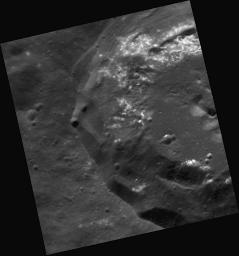MESSENGER's discovery of "hollows," shallow, irregular depressions that are often bright in nature, is a fascinating surprise, and this recently acquired image reveals yet more occurrences of hollows on the floor and wall of a 30-kilometer crater. Mercury's hollows often have a distinct color from the neighboring surface, and spectacular examples of many hollows that coalesced to form an etched appearance can be seen on the floors of Tyagaraja and Sander. Hollows are also found in more confined locations, like on theinner ring of Raditladi basin, a slumped crater wall, or the central peaks of craters. Learn more about hollows and how they may have formed by checking out this NASA ScienceCast entitled The Sleepy Hollows of Mercury.
This image was acquired as a high-resolution targeted observation. Targeted observations are images of a small area on Mercury's surface at resolutions much higher than the 250-meter/pixel (820 feet/pixel) morphology base map or the 1-kilometer/pixel (0.6 miles/pixel) color base map. It is not possible to cover all of Mercury's surface at this high resolution during MESSENGER's one-year mission, but several areas of high scientific interest are generally imaged in this mode each week.
The MESSENGER spacecraft is the first ever to orbit the planet Mercury, and the spacecraft's seven scientific instruments and radio science investigation are unraveling the history and evolution of the Solar System's innermost planet. Visit the Why Mercury? section of this website to learn more about the key science questions that the MESSENGER mission is addressing. During the one-year primary mission, MDIS is scheduled to acquire more than 75,000 images in support of MESSENGER's science goals.
Date acquired: October 03, 2011
Image Mission Elapsed Time (MET): 226118011
Image ID: 837160
Instrument: Narrow Angle Camera (NAC) of the Mercury Dual Imaging System (MDIS)
Center Latitude: 50.65°
Center Longitude: 319.8° E
Resolution: 23 meters/pixel
Scale: The partially shown crater has a diameter of approximately 30 kilometers (19 miles)
Incidence Angle: 51.4°
Emission Angle: 26.6°
Phase Angle: 78.0°
These images are from MESSENGER, a NASA Discovery mission to conduct the first orbital study of the innermost planet, Mercury. For information regarding the use of images, see the MESSENGER image use policy.

 Planetary Data System
Planetary Data System












